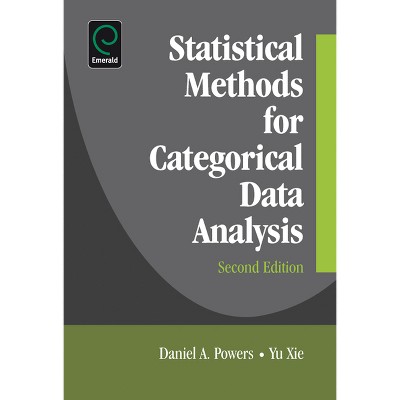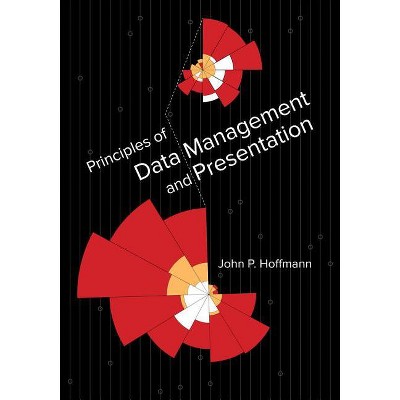Sponsored

Regression Models for Categorical, Count, and Related Variables - by John P Hoffmann (Paperback)
$65.00
In Stock
Eligible for registries and wish lists
Sponsored
About this item
Highlights
- Social science and behavioral science students and researchers are often confronted with data that are categorical, count a phenomenon, or have been collected over time.
- About the Author: John P. Hoffmann is Professor of Sociology at Brigham Young University.
- 432 Pages
- Social Science, Statistics
Description
About the Book
"Social science and behavioral science students and researchers are often confronted with data that are categorical, count a phenomenon, or have been collected over time. Sociologists examining the likelihood of interracial marriage, political scientists studying voting behavior, criminologists counting the number of offenses people commit, health scientists studying the number of suicides across neighborhoods, and psychologists modeling mental health treatment success are all interested in outcomes that are not continuous. Instead, they must measure and analyze these events and phenomena in a discrete manner. This book provides an introduction and overview of several statistical models designed for these types of outcomes--all presented under the assumption that the reader has only a good working knowledge of elementary algebra and has taken introductory statistics and linear regression analysis. Numerous examples from the social sciences demonstrate the practical applications of these models. The chapters address logistic and probit models, including those designed for ordinal and nominal variables, regular and zero-inflated Poisson and negative binomial models, event history models, models for longitudinal data, multilevel models, and data reduction techniques such as principal components and factor analysis. Each chapter discusses how to utilize the models and test their assumptions with the statistical software Stata, and also includes exercise sets so readers can practice using these techniques. Appendices show how to estimate the models in SAS, SPSS, and R; provide a review of regression assumptions using simulations; and discuss missing data. A companion website includes downloadable versions of all the data sets used in the book"--Provided by publisher.Book Synopsis
Social science and behavioral science students and researchers are often confronted with data that are categorical, count a phenomenon, or have been collected over time. Sociologists examining the likelihood of interracial marriage, political scientists studying voting behavior, criminologists counting the number of offenses people commit, health scientists studying the number of suicides across neighborhoods, and psychologists modeling mental health treatment success are all interested in outcomes that are not continuous. Instead, they must measure and analyze these events and phenomena in a discrete manner. This book provides an introduction and overview of several statistical models designed for these types of outcomes--all presented with the assumption that the reader has only a good working knowledge of elementary algebra and has taken introductory statistics and linear regression analysis. Numerous examples from the social sciences demonstrate the practical applications of these models. The chapters address logistic and probit models, including those designed for ordinal and nominal variables, regular and zero-inflated Poisson and negative binomial models, event history models, models for longitudinal data, multilevel models, and data reduction techniques such as principal components and factor analysis. Each chapter discusses how to utilize the models and test their assumptions with the statistical software Stata, and also includes exercise sets so readers can practice using these techniques. Appendices show how to estimate the models in SAS, SPSS, and R; provide a review of regression assumptions using simulations; and discuss missing data. A companion website includes downloadable versions of all the data sets used in the book.About the Author
John P. Hoffmann is Professor of Sociology at Brigham Young University. Before arriving at BYU, he was a senior research scientist at the National Opinion Research Center (NORC), a nonprofit firm affiliated with the University of Chicago. He received a master's in Justice Studies at American University and a doctorate in Criminal Justice at SUNY-Albany. He also received a master's in Public Health with emphases in Epidemiology and Behavioral Sciences at Emory University's Rollins School of Public Health. His research addresses drug use, juvenile delinquency, mental health, and the sociology of religion.Dimensions (Overall): 9.8 Inches (H) x 6.9 Inches (W) x 1.0 Inches (D)
Weight: 1.95 Pounds
Suggested Age: 22 Years and Up
Sub-Genre: Statistics
Genre: Social Science
Number of Pages: 432
Publisher: University of California Press
Format: Paperback
Author: John P Hoffmann
Language: English
Street Date: August 16, 2016
TCIN: 89910103
UPC: 9780520289291
Item Number (DPCI): 247-44-3451
Origin: Made in the USA or Imported
If the item details aren’t accurate or complete, we want to know about it.
Shipping details
Estimated ship dimensions: 1 inches length x 6.9 inches width x 9.8 inches height
Estimated ship weight: 1.95 pounds
We regret that this item cannot be shipped to PO Boxes.
This item cannot be shipped to the following locations: American Samoa (see also separate entry under AS), Guam (see also separate entry under GU), Northern Mariana Islands, Puerto Rico (see also separate entry under PR), United States Minor Outlying Islands, Virgin Islands, U.S., APO/FPO
Return details
This item can be returned to any Target store or Target.com.
This item must be returned within 90 days of the date it was purchased in store, shipped, delivered by a Shipt shopper, or made ready for pickup.
See the return policy for complete information.
Trending Non-Fiction


$19.31
was $20.98 New lower price
Buy 1, get 1 50% off select books & accessories
4 out of 5 stars with 57 ratings

$19.58
MSRP $29.00
Buy 1, get 1 50% off select books & accessories
4.6 out of 5 stars with 12 ratings

$4.59
MSRP $7.99
Buy 1, get 1 50% off select books & accessories
4.8 out of 5 stars with 118 ratings

$6.20
MSRP $10.95
Buy 1, get 1 50% off select books & accessories
4.8 out of 5 stars with 33 ratings

$7.09
MSRP $9.99
Buy 1, get 1 50% off select books & accessories
4.9 out of 5 stars with 45 ratings





